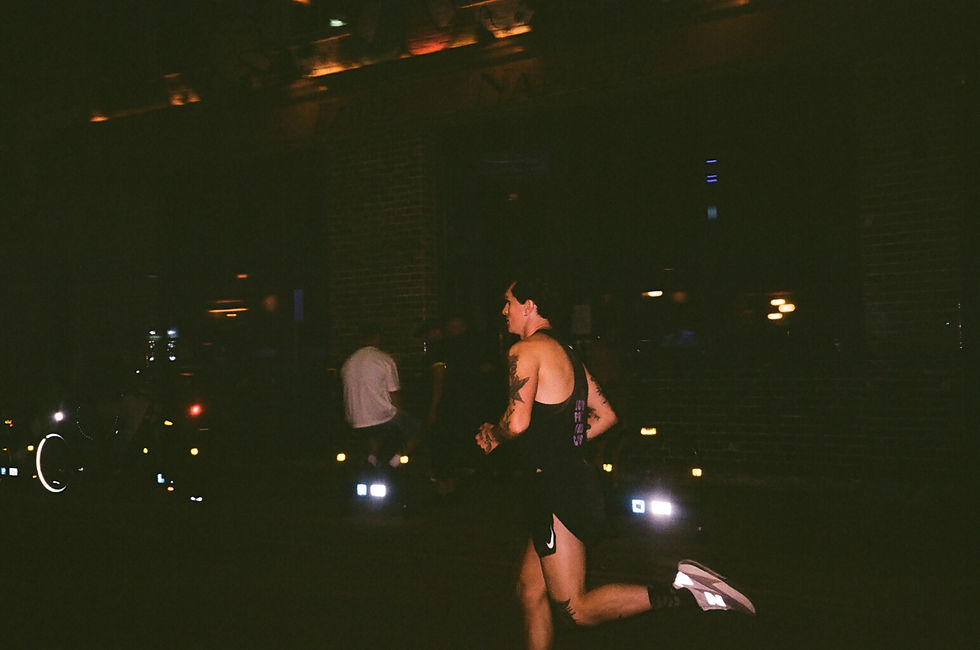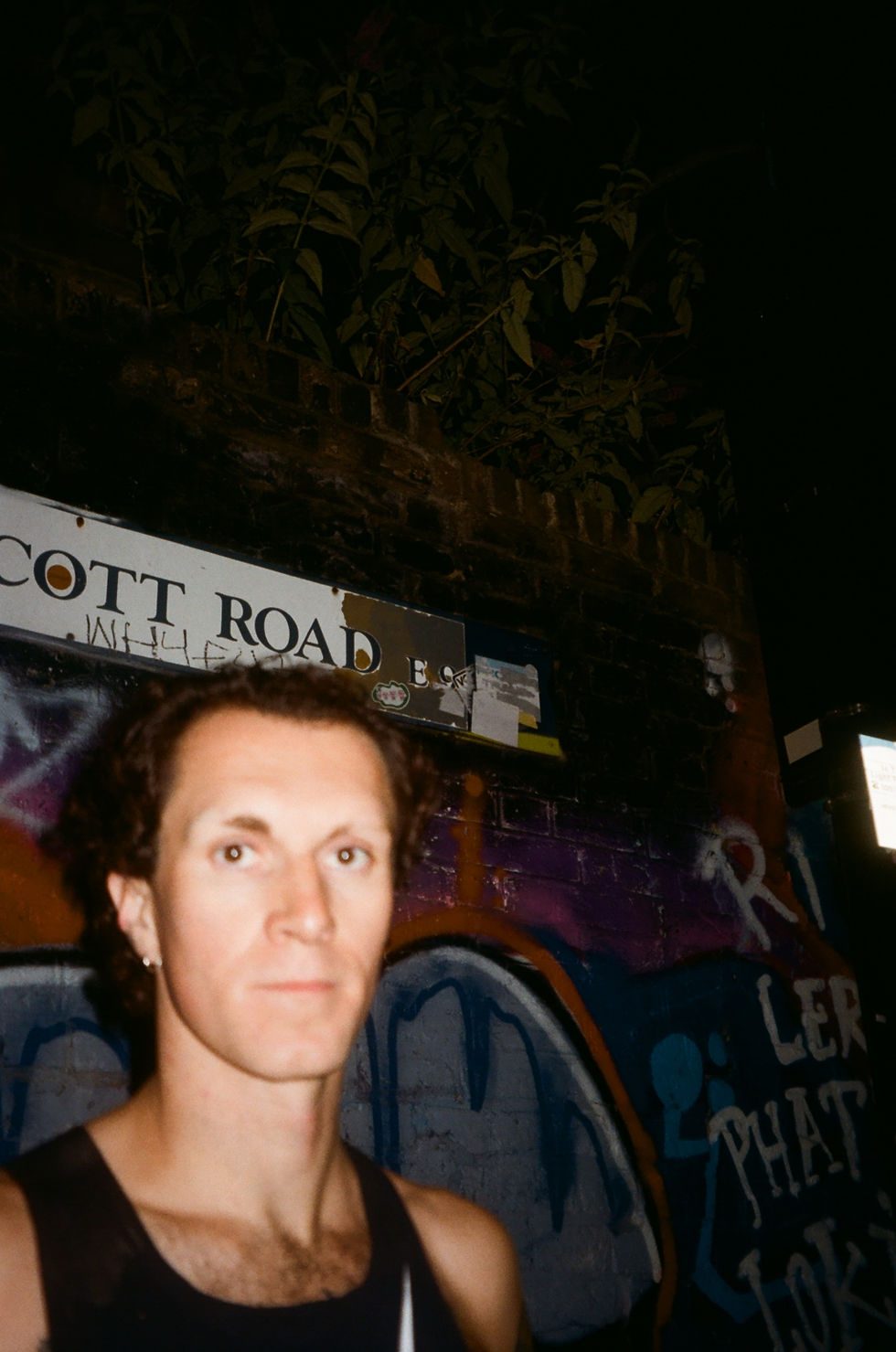The body keeps the score: Scott Coller
- UNL

- Oct 9, 2025
- 13 min read
Updated: Oct 10, 2025
October 2025 | Babajide Osikoya

I think going on a run is a challenge to yourself more than anything else. I'm preparing for my first ever one, gearing up slowly to complete the EDP Lisbon marathon in Portugal this October 2025.
I'm lucky to have a friend who's completed six. In this conversation, Scott Coller, 27, shares how he swapped his habit of cigarettes and drinking for completing six marathons in three years.
Emphasising the nature of holding himself accountable and being his own hype man. Scott predicts the time he’s going to finish his rather lengthy runs and goes on to prove it:
“As much as it's a form of keeping myself in check mentally and physically, it’s also a way of communicating..."
Scott shares.
Babajide Osikoya: How did this running obsession start?
Scott Coller: It wasn't anything overnight - it happened gradually. My dad, who is 60 now, is a big runner. So whenever I came home and stayed with him, he’d drag me out the door to go on a run with him.
I’ve naturally had the fitness where I can just get out and run five kilometres. I’m grateful for that.
You used to drink and smoke, then something changed. What was it?
I’ve had moments of waking up way too hungover a few days in a row and thinking ‘I can’t do this’.
In 2020, I did 150 days of no drinking and during that time I did a bit of running as well, but that wasn’t where my story started because I went back to drinking and smoking.
I didn’t have one of those euphoric wake up one day moments … It happened gradually. But, when I did have a moment of maybe I should stop with the cigarettes and drinking, it was three years ago now.
I’m not a big believer in the whole streak nature. I’m not one of those people who have run for 1000 days straight. It’s not about abstinence for me. It’s certainly more about changing habits.
Six months into my journey, I read Atomic Habits by James Clear and was able to cross reference my journey in that book. I now find a position for myself in using social media to hopefully be a bit of an intervention to people like myself. People that have had weeks of sobriety here and there, like a dry January or train for a 5k run but then slipped back into their worse habits.
I want to be an example of how you can make this long term and sustainable because the longer it goes, the better it gets.
What’s been your most difficult run?
Brighton, 2021, my first marathon was the hardest and it’s one of the things I’m most grateful for. It was such a humbling day and closest I’ve come to pushing beyond my physical limit. I didn’t quite understand what was needed going into the event. I was a little bit optimistic and ran a big positive split.
A positive split is when you run your second half slower than your first half, the positive in that statement is not a good thing. While at that second half, finishing the race, you want a negative split - quicker than your first. It’s a way of guaranteeing you finish strong. I was pretty close to not finishing that day because I started my run so quickly.
You then moved to Australia and did marathons there. Why did you move?
January 2020, I booked a one way ticket to Melbourne, Australia, on a working visa. Then the coronavirus and lockdown happened and it got postponed. The plan was to figure it out as I go.
Luckily, I was able to change my flight from Melbourne to Adelaide where my girlfriend’s from. I eventually left about 18 months later. Between the time of booking and flying, I was able to get myself into a better position mentally.

I transitioned my life from London to Adelaide and it was an amazing two years. I grew a deep fondness and lived a bit more outdoors during that time. Being from the South East of England we love any glimpse of sun that we get.
It's very hot in South Australia and pretty sunny. It's adds to the quality of life, you’re able to enjoy the simple things like being on the beach.
Why did you start a run club in a foreign country?
It was a way of making friends in Adelaide to make myself visible. I was training for a marathon and wanted to make a club to connect with others by making friends with people who shared appreciation for sobriety and running in the area. I attracted people to come and run with me for a couple of nights in the week. But as things seem to have the habit of doing in my life, that didn’t happen. Something else did.
People started messaging me asking for help with their running.

A week after I started the Instagram account with the name Scott Free Run Club I realised that this isn’t a club at all. It’s a coaching platform. A chance for me to share what I’ve learned.
People were interested to consult me on what I’ve learned regarding my running and sobriety.
It has become a situation where people of all abilities and backgrounds are welcomed. There’s thousands out there doing what I’m doing. I hope to be a positive role model in the industry.

I want to build a more sustainable and data driven approach to running. I’m using data from smartwatches to plan programmes that aren't repetitive or copy and pasted from anywhere else. I take pride in my plans being bespoke, exciting and challenging.
My role as a coach isn’t to answer every question. My responsibility is to inspire and leave crumbs along the trail to build curiosity. Running is an inclusive and social thing. I want to share my experience and see people do their own thing.
What is needed to push running forward?
The way we look at coaching. It doesn't need to be this institutional college sort of situation. I don’t agree with any of that sort of bureaucracy. It's quite a traditional system at the moment.
The more people get involved, the more we all benefit. It’s an amazing thing the more people are active in any sport. Not just long distance running, any athletics field event, able bodied or para athletic event. I had the pleasure of going to the London Diamond League. A sold out event with 50,000 people in the stadium. There were as many cheers for the wheelchair events, as there were for the men’s mile and women’s 800. It’s inspiring to me.
There are natural leaders among us. I wouldn’t pride myself on being a natural leader. It’s certainly something that's out of my comfort zone. That's possibly why I enjoy challenging myself with it so much.
There’ll be a place for coaches of all abilities the more representation there is in running. Coaches that aren't just trying to make a bit of cash on the side, but coaches that really care. People like myself. I'm biassed, but I think we’re the future.

I want to know about the times you were running and had to go for a poo. Is it a common thing people face?
That brings me onto one of my favourite curiosities within this universe - the law of the reverse effect.
Say I say to you, “I want you to run to my house as quickly as you can,” and “there’s £1000 on the line,” that's going to get you moving quite quickly.
Whereas, if I coached you through the steps, sharing the quickest way instructing you not to go flat out but take caution because it’s a bit of distance from where each of us lives. Regardless of how big that incentive is to get to my house, you’re going to run with a bit more understanding of what you’re going for.
Commonly, sprinting coaches will tell their athletes to run at 85%. Because as soon as you run at 100%, you seize up - your body doesn’t work. 85% is the reverse effect.
If you’re running with caution and you’ve got your eyes clearly on the target, you’re not emotional, you’ll get there, right?
If you run - balls to the wall - it’s not going to go right. This has taken me a long time to learn. The marathon I needed to have a dump was my second marathon and it was in Adelaide, Australia.
I didn’t understand the importance of nutrition in running, making sure your gut is trained and the law of the reverse effect - when you try something and the opposite happens.
I hadn’t trained my gut that day and went out way too hard on the race. Around 10 kilometres, very early on in the marathon, I felt my stomach wasn’t happy. I was hoping it was just because I needed to ‘pee’ while running. There’s no way to say this politely. But I’ve been practising peeing my pants while running. Luckily, running clothes are made from advanced materials.
Sorry, let me interrupt you. You were practising peeing your pants?
Yeah in training. These fabrics are water resistant, you can piss your pants and be dry in like five minutes.
(Wow)
It’s crazy right. And only when I'm running. I’m not doing it everyday.
So I took a pee and found out immediately - unfortunately that wasn't the problem. I actually needed to use the bathroom to really do my business.
I managed to hold on for another 10 kilometres until I could find a bathroom which was the halfway point. It was more like a Formula 1 nose change. It lasted around 40-50 seconds.
In a race the timer doesn’t stop — it keeps running.
While I’m in the bathroom, there’s a knock on the door – it’s another runner and he jumps in after me. I barely have time to get out. He’s in and I’ve taken off.
This marathon was two laps and at this point, I’ve just done one lap. So I’ve run half a marathon, used the bathroom and on the clock it was about 1 hour 31 minutes. I was trying to go under three hours and was being paced to do so. I made my best efforts to catch back up the guys that were pacing me. But again, the law of the reverse effect.
I was trying to undo a lot of damage very quickly but I should have spread that effort over a decent amount of time. Instead, I caught up quickly and it sent my stomach into worse terrain. To the point where as soon as I tried to drink any water or carbohydrate gels, it was upsetting my stomach even more.
I was trying to hold a shit while running and as you can imagine it was not good. Not to mention, I’ve got this extra weight in my belly — It was an awful situation. But I did end up breaking 3 hours and it was my first time doing so.
I ran 2 hours, 59 seconds and something like 9.2 of a second. Unfortunately, the official results didn’t go to the decimal place. They only went to the nearest second, so my official time was three hours and nothing. But I was sure that I’d broken three hours that day. Amazingly, the guy that had been knocking on the toilet door while I was in there, a guy named Tony, we started chatting and he still coaches me today. Thankfully, I haven’t had to piss my pants in a marathon again. I’ve got my bowels and bladder down to a tee.

When I spoke to you last you mentioned you might have alopecia from the stress of running?
So I've had these spots appear and it’s likely to be a result of low iron.
It could also be a calorie deficit. We have to be careful as runners and need to replace the energy we use. I struggle with iron and we do lose a lot of iron as runners.
I consider myself to need the sun like a plant. Plants don’t need to be taught how to look after themselves, they know to lean towards the sun.
Would this have anything to do with your diet? You're mostly plant based.
Yeah mostly plant based but also seafood and eggs. Quite a picky diet, it can be difficult to dine out.
The body keeps the score. All the while I'm losing hair - I’m trying to rectify that and make sure I’m on the right path.
As humans, there’s so many choices we make. Whether it be diet, lifestyle, exercise and even our socials. What we do with our lives is so important. We don’t necessarily have to be the best we can be. But we should do the best by ourselves.
How many competitions have you been in?
Can't give a definitive number, but I've raced everything from the mile on track, to Met League Cross Country, to Marathon Majors. I'm super fortunate to have gotten to the start line of each of my six marathons in slightly better shape than the last, so six PB's on the trot has been pretty nice.
Why do you still run?
Consistency is pretty much number one.
It doesn’t come before a good amount of sleep and a good diet. It also doesn’t come before being mentally sound. But I think consistency is pretty close to those things. It’s not rocket science, but you have to keep turning up.
Running has become a trend. It’s considered cool. I’ve even heard people say its the new way to date.
Firstly, I love the fashionable element of running and the kits. I think the rise of super shoes has made running so exciting.
I love the popular culture element and running being the in thing. I think it's amazing. Partly because there’s naturally talented people and they had no idea. People have never trained and run a stupid time with no idea what they’ve just done. It’s fascinating and happens a lot. Natural talent is rare.
Anyone that hasn’t put themselves on a start line of any of these amazing events that are held internationally, that you can sign up to, would never know.
If your mates say we’re gonna do this race - I think it’s worth it. Go and get yourself some nice shoes and turn up. I’m all for that. Even though it’s hard to get into the big races because they get sold out - which is frustrating.
I’ve worked in a running shop and seen firsthand the explosion of running.

I’ve had a lot of business as a coach and it’s been amazing. It’s an amazing time for running. It’s a great tool for people for so many different reasons.
I watched a Youtube video which concluded that weight training is better for your health in comparison to running? What do you think? Running or weight training?
I can see why perhaps for longevity and overall health, weight lifting is probably a smarter choice. Purely on the basis that I don’t think with resistance training you can overdo it as easily.
Of course you can get injured and it can become a toxic thing with body image. But if you’re going to smash yourself with a really hard running workout, kind of the best thing to go for is another run, a lighter run.
I do wonder what that does to the body, even with all my experience now as a coach. It's a lot of movement and a lot of time on the feet. It’s not like other sports, like swimming or cycling - where there’s not as much resistance. There’s a lot of resistance with running.
I can see with something like weightlifting that you’d get all the same physical and psychological benefits without the same sort of fatigue or breakdown in the body. It’s a conflicted one. Long distance running can particularly be difficult.
My goal is to navigate as an athlete without getting injured and progressively get fitter. That means I'm playing the long game with my bet. I’ve put money in and I’m not expecting a payout for two or three years.
Whereas there is the other approach that goes all in and sees what can happen in six months. But there is a risk of going bust.
I’d encourage runners to reach out for help and play the long game a bit more. I want running to be the healthiest and most sustainable.

Has running replaced your unhealthy addictions?
Addiction is a complex word. At this point, it’s been used so often it can be an effect as opposed to an affect. Like I’m addicted to buying running shoes. That’s probably true, I love running shoes. But it’s not a problem. I’m not going to lose my relationship because of how many shoes I bought recently.
Was I addicted to drinking? I don’t know, but it was a habit. It was a big part of my life. I’m quite a social creature. I love talking to people. My background is in photography.
I love having a camera on me and striking up a conversation with someone about a tattoo they might have or whatever it is about them. The jacket they’re wearing or their shoes. I had a great way of doing that in pubs and bars. I always found that having a drink was a good sort of lubricant to get my social energy going, as it is for a lot of people.

When I swapped out that habit for running and taking care of myself, I actively wanted to give up cigarettes. While I was at a pub with a pint in my hand, I’d probably want a cigarette. And I was smoking loads.
Nicotine is a fascinating drug, genuinely. I’ve researched it so much. It’s an awful delivery system, through vapes and cigarettes. I knew I needed to not drink to get rid of that nicotine habit. I changed the habit and very quickly, not only did my sort of day-to-day change, but the conducive behaviour of going to the pub regularly and chatting to people was different. Everything changed. A diet of eating burgers and chips isn't conducive to a person that's running 11 hours a week.

I found my behaviour changing getting into yoga and learning more about sustainability and the environment. It wasn’t something I was doing actively. I just changed the habit.
There’s a quote by Rich Roll - mood follows action. It’s like waking up feeling shit and going out for a run because that’s a non-negotiable. I’ve got to run my plan that my coach has set for me. I’m quite keen on being objective with my plan, getting on with what’s prescribed and asking questions later.
What is the thing that I can be sure of? Is that my mood is going to follow the action. I’ve done the action and can get those endorphins once I get home. That is a habit that is conducive to my lifestyle.
I don’t think it’s impossible to change your habits. There's a balance that can be found. A lot of successful runners still go out and enjoy alcohol and social times. It's about moderation for me, finding a balance in running, going out with friends, letting the hair down you might say or in my case, losing it.
It was a change in habits that left this whole change in its wake. It’s fascinating. I recently heard that the opposite to addiction isn’t sobriety, it’s purpose. For a while there I was looking for answers in a vacuum, running hasn’t answered too much for me, it’s just changed the fundamental questions I’m asking ...
CREDITS:
Subject: Scott Coller
Text, photography & production: Babajide Osikoya
Videography: Gabriel Aiyelabola
Drone operation: Toaha Kamal
Photography assistance: Malika Satori and Hanane Taoubi














Comments